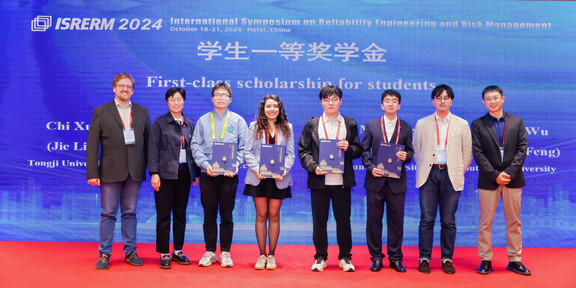Nataly Manque Roa wins First Class Student Award!

From October 18-21, 2024, the 9th International Symposium on Reliability Engineering and Risiko Management (ISRERM2024) was held at the Hefei University of Technology in China. ISRERM is a significant biennial international conference that serves as a pivotal platform for the exchange of knowledge and innovative applications in the fields of reliability-based, risk-based, and uncertainty-informed decision-making. Its primary focus lies in addressing safety-related aspects throughout the entire lifecycle of engineering systems.
The Chair for Reliability Engineering (CRE) participated in this four-day event with a team of three members. A notable highlight of the conference was Nataly Manque receiving the prestigious “First Class Student Award” for her outstanding paper presentation. An independent jury has selected Nataly’s article as one of the best, evaluating both the submitted paper and her performance during the presentation sessions.
In her paper, titled “A Reduced-Order Model for Interval Analysis in Linear Dynamical System”, Nataly Manque explores methods to address uncertainty in linear dynamical systems. The study investigates how imprecision in system properties—such as mass, damping, stiffness, or environmental conditions—can lead to epistemic uncertainty in system responses. To tackle the challenges of high computational costs associated with interval analysis, Nataly proposes a Reduced-Order Model (ROM) that simplifies the analysis process by projecting equilibrium equations into a smaller-dimensional basis using normalized modal shapes. The framework was successfully tested by estimating the bounds of the maximum Frequency Response Function (FRF) of a truss structure affected by uncertain masses.
We are immensely proud of Nataly and view this award as a source of inspiration for further groundbreaking research in the future.








